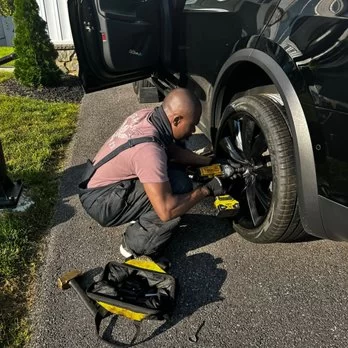- What to Do First When You Have a Flat Tire
- How to Change a Flat Tire Yourself
- Why You Should Call for Professional Help
- How to Prevent Future Flat Tires
What to Do First When You Have a Flat Tire
Getting a flat tire while on the road can be a stressful experience, especially if you’re in an unfamiliar location or in a rush. However, staying calm and taking a few key steps can help you handle the situation more efficiently. Here’s what you should do immediately:
- Pull Over to a Safe Location: The first priority is your safety. If you notice that you have a flat tire, slow down and pull over to the side of the road, preferably to a safe, flat, and stable area. Avoid stopping on hills or curves where visibility might be poor for other drivers.
- Turn on Your Hazard Lights: To alert other drivers of your situation, make sure your hazard lights are on. This will help keep you safe while you assess the situation and wait for assistance if necessary.
- Assess the Damage: Take a quick look at the flat tire to determine if it is repairable or if you’ll need to replace it. Check for visible punctures, tears, or other damage that could be causing the flat.
How to Change a Flat Tire Yourself
If you feel comfortable and have the proper tools, you can attempt to change the flat tire yourself. Here’s a step-by-step guide on how to do it:
- Gather Your Tools: Make sure you have the necessary tools for the job, which include a jack, lug wrench, and a spare tire. You should also have a wheel chock to secure the opposite tire and prevent the vehicle from rolling.
- Lift the Vehicle: Use the jack to lift the car off the ground. Ensure that the jack is placed on a stable part of the car frame, away from any moving parts. Lift the vehicle high enough to remove the flat tire and replace it with the spare.
- Remove the Flat Tire: Use the lug wrench to loosen the lug nuts in a star pattern. Once the nuts are loosened, remove them completely and take off the flat tire.
- Install the Spare Tire: Place the spare tire onto the hub and hand-tighten the lug nuts onto the bolts. Once the tire is in place, lower the car with the jack, and then tighten the lug nuts fully in a star pattern to ensure they are secure.
- Lower the Vehicle and Check the Tire: Once the car is back on the ground, double-check that the lug nuts are tightened properly. Lower the jack completely and store your tools and flat tire before getting back on the road.
Changing a tire might seem daunting at first, but with the right tools and preparation, it’s a skill that can save you time and money in an emergency situation. However, if you’re not comfortable doing it yourself, there are other options available.

MR. TIRE INC.
2078 New York Ave, Huntington Station, NY 11746, USA
Why You Should Call for Professional Help
Although changing a flat tire yourself can be an option, there are many situations where calling for professional roadside assistance is the best choice. Here’s why:
- Safety: If you're in a dangerous location, such as near high-speed traffic, it’s best to call for professional help. A roadside assistance provider will have the expertise and equipment to handle the situation safely.
- Efficiency: Professionals are trained to change a flat tire quickly and efficiently, which can help you get back on the road faster than trying to handle it yourself, especially if you lack experience.
- Expertise: A professional roadside assistance service can not only change the tire but also assess the condition of your tire and recommend any necessary repairs or replacements.
At Rescue & Towing, we offer reliable and quick roadside help for flat tires. Our experienced team will ensure that you’re back on the road in no time, no matter where you are. Don’t hesitate to reach out if you find yourself stuck with a flat tire!

MR. TIRE INC.
2078 New York Ave, Huntington Station, NY 11746, USA
How to Prevent Future Flat Tires
While flat tires can happen unexpectedly, there are steps you can take to reduce the risk of experiencing one again in the future. Here are a few tips for tire maintenance and prevention:
- Regularly Check Tire Pressure: Under-inflated tires are more prone to punctures and damage. Check your tire pressure regularly, especially before long trips, to ensure they are inflated to the manufacturer’s recommended levels.
- Inspect Tires for Damage: Routinely inspect your tires for any signs of wear, cuts, or punctures. If you notice anything unusual, have the tire inspected by a professional to determine if it needs to be repaired or replaced.
- Avoid Road Hazards: Drive carefully and avoid running over sharp objects or debris on the road that could puncture your tire. Be especially cautious when driving on poorly maintained or unfamiliar roads.
- Rotate Your Tires Regularly: Tire rotation ensures even wear and extends the life of your tires. Make it a habit to rotate your tires every 6,000 to 8,000 miles, or as recommended by your vehicle manufacturer.
By following these simple tire maintenance tips, you can help prevent future flat tires and improve the overall safety and performance of your vehicle.
If you ever find yourself in need of flat tire roadside help, remember that Rescue & Towing is here to assist. Our professional team is just a call away for all your tire-related emergencies.





























